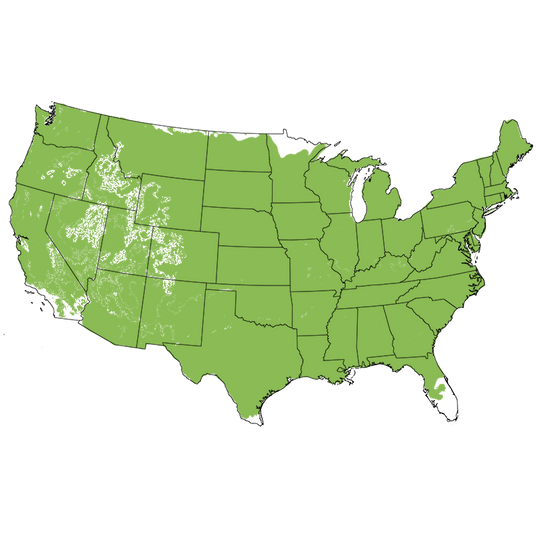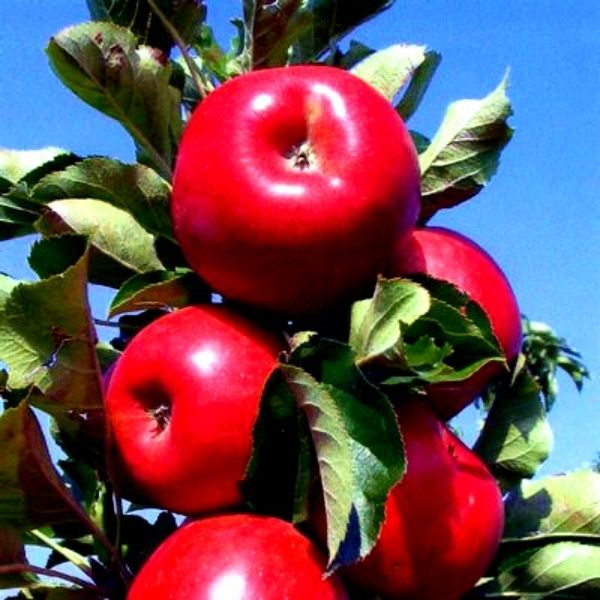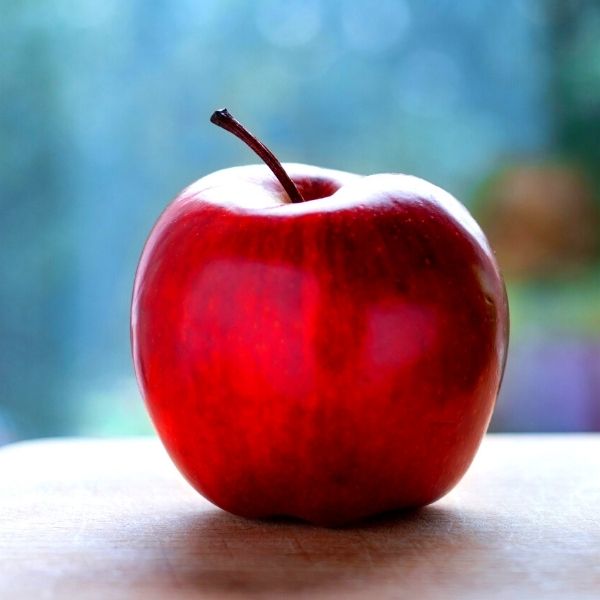Urban Apples® Tasty Red™ Columnar Apple Tree
Malus x 'UEB 3358-3'
Planting & Care
Planting & Care
Delivery and Shipping
Delivery and Shipping
Preorder Shipping Schedule
We ship your plants when it's safe to transport them to your zone. Dates are estimated and subject to weather delays.
| Zone 3-4 | Week of March 30th |
| Zone 5 | Week of March 16th |
| Zone 6 | Week of March 2nd |
| Zone 7-12 | Week of February 23rd |
Shipping Rates
Ships in 3-4 business days • Tracking provided • Weather protected
| Under $50 | $9.99 |
| $50 - $99.99 | $14.99 |
| $100 - $149.99 | $16.99 |
| $150 - $198.99 | $24.99 |
| $199+ | FREE |
✓ Zone-specific timing • ✓ Professional packaging • ✓ Health guarantee

Plant Sentry™ Protected
Your order is protected by our compliance system that:
- Prevents restricted plants from shipping to your state
- Ensures plants meet your state's agricultural requirements
- Protects gardens from invasive pests and diseases
Few things are as American as apple pie. Unfortunately, few of us have space in our yards for an entire apple orchard, let alone a single Apple tree! The Urban Apples® Tasty Red™ Columnar Apple Tree (Malus x 'UEB 3358-3') is going to change that! This is not your typical Apple tree. Staying small and narrow-growing - only 2-3 feet wide. That means that these columnar Urban Apple trees are perfectly sized for modern and container gardens.
In the spring the ramrod-straight branches are covered in romantic, sweet-scented, white Apple blossoms. Then they are covered in full-sized Apples nestled along the limbs like Brussels Sprouts. Imagine being able to pick full-sized Apples straight from your patio or balcony! Tasty Red™ is sweet and juicy and ripens mid-season, perfect for all-purpose eating, baking and cooking.
This isn't some Apple-pie-in-the-sky dream either. These form Apples the first year you plant the tree and only have higher yields every year after that! These beauties need a pollinator tree so plant Tasty Red™ with one or more of its sisters in the Urban Apples® series, or a white-flowering Crabapple Tree for the best crop possible! You'll double the yield and double the fun!
Tasty Red™ is a modern solution for smaller urban gardens! Staying short and only 2-3 feet wide, Tasty Red™ gives huge Apple yields in a small-footprint sized space. First developed in the Czech Republic, Urban Apples® have been a revolution in at-home fruit growing!
Planting and Application:
Tasty Red™ and its pollinator look great paired in matching containers on the patio, flanking the entrance of a walkway or anchoring a garden bed. The formal columnar effect combined with the blossom and red jeweled fruit will certainly turn heads! Take edible landscaping to the next level with a pair of sentries standing on either side of your front entry! Mark the entrance to a garden path with a potted or in-ground pair of Columnar Apple Trees on either side!
Plant Urban Apples® Columnar Fruit Trees as accents and backdrops for your Victory Garden, and alternate between the different Urban Apples® varieties for a beautiful fruiting hedgerow! You'll love having fruit trees growing among the vegetables and herbs, and your produce will appreciate not being shaded out by a large tree.
Container gardeners, porch and patios in planters, or in the ground in that sunny but skinny patch of ground that runs along the side of your home leading to the back yard. It's hard to believe but totally true! You can grow Apples in any sized garden, even on your balcony or rooftop garden, with these space-saving trees!
- Showy Bright Red Apples
- Bright Green Foliage
- Columnar Apple - Only 2-3 Foot Wide
- Full-Sized Sweet, Juicy Fruit
- Fragrant White Spring Flowers Pollinators Love
- Space-Saving Container & Edible Landscaping Must-Haves
#ProPlantTips for Care:
Columnar Apple Trees are easy-to-grow and need a minimum of 6 hours of direct sunlight a day for optimal flowering and fruiting. Plant Apple Trees like Tasty Red™ and its pollinator tree in a well-drained, enriched location or container with good drainage and ample room for its roots. Provide these fruiting trees with regular moisture access and fertility, plus a 3-4 inch deep layer of arborist bark chips over their root system.
Provide container-grown Apples with a protected winter location in colder growing regions of USDA planting zones 4 to 9. It is recommended that you stake your tree to support its straight trunk and keep container plants from toppling over in heavy winds and storms.
- Full Sun
- Well-Drained Enriched Soil
- Appreciates Mulched Beds
- Regular Moisture & Fertility
- Very Easy Care & Little To No Pruning
Small footprint, big flavor! The Urban Apples® Tasty Red™ Columnar Apple Tree will bring delightful beauty and tasty rewards without sacrificing precious space! Order yours today at NatureHills.com and see for yourself!
Urban Apples® Columnar Apple Tree Frequently Asked Questions
When to Plant Urban Apples® Columnar Apple Trees
Planting Bareroot trees as soon as you can dig a hole in spring and until hot weather, the earlier the better. Plant container Apple trees throughout the growing season with complete success - that is the benefit of container plants - to extend the planting season. Your County Agricultural Extension Office is a great resource for first and last frost dates in your area.
How to Plant Urban Apples® Columnar Apple Trees
Dig a large hole only as deep as needed to accommodate the bareroot or container root ball, and twice as wide. Add Nature Hills Root Booster to speed root establishment. Remove the pot or bag and situate it into the hole so the top of the soil (soil line if bareroot), is level with the new location's soil being careful not to plant too deep. Water in again very well and backfill with the same soil you dug up, tamping down gently to ensure there are no air pockets.
Top off with a 3-4 inch thick layer of Arborist mulch. Consider staking your tree to keep its trunk growing straight for the first year to ensure it stands tall against strong winds and drifting snow.
Pruning Apple Trees
When to Prune Urban Apples® Columnar Apple Trees
Trim off any broken branches from delivery as soon as you take them out of the box. Prune and trim Apple trees while dormant, in late winter or early spring, before you see new growth.
How to Prune Urban Apples® Columnar Apple Trees
Your Columnar Apple shouldn't need much pruning at all! But in case you do need to give yours a trim, here's how.
Dormant prune to:
- Remove any double leaders or narrow crotch angles
- Eliminate any crossing branches
- Thin interior branching and leave the fruiting spurs and strong branches in place opening up the canopy
- Branching at least 24-36 inches above the ground
Prune Apple trees in the summer to:
- Control size and shape by reducing the length of longer new growth on vigorous trees
- Remove water sprouts on the main trunk or older branches in the crown
- Remove suckers at the base of the trunk
- Thin fruit during heavy years on established trees
How to Care for Urban Apples® Columnar Apple Trees
Growing an apple tree is easy when proper soil, good drainage, attention to moisture, and regular fertility are maintained. Once you've chosen an apple tree that works for your climate, in the size you need for your landscape, and its pollinator (if needed), then you've accomplished half the battle!
- Apple trees do best in full sun and well-drained soil
- Water your apple trees when it gets dry - especially during the fruit production stage, and drought periods to keep it stress-free
- Use arborist wood chips to mulch over the roots of your apples
- Have your soil tested to see what your soil may be lacking before adding fertilizers
- Maintenance pruning and shaping
Apple trees will tolerate a wide range of soils, so long as water and nutrients are not limited and the pH level is adequate.
How to Fertilize Urban Apples® Columnar Apple Trees
For the first year, water alone is most important. It is always best to get a soil test to see what your soil is lacking before adding more fertilizers. Once established, a fertilizer routine may be beneficial. We do offer some excellent slow-release organic options, applied according to the package directions.
Fruit trees need more phosphate and it's possible to apply too much nitrogen which affects the soil's pH. Test soil acidity or alkalinity using a pH Tester.
Fertilize in spring when you first see new growth emerging.
- Don't overdo it
- Phosphates are your friends
- Pay attention to pH in areas with extremely high or low soil pH
- Follow the directions
Urban Apples® Columnar Apple Tree Pollination Info
In addition to a white-flowering Crabapple tree like Dolgo, Urban Apples® Columnar Apple trees are not self-fruiting and need a pollinating partner. Pair with one of these varieties:
- Urban Apples® Golden Treat™ Columnar Apple
- Urban Apples® Blushing Delight™ Columnar Apple
- Urban Apples® Tangy Green™ Columnar Apple Tree
- Urban Apples® Blushing Delight™ & Golden Treat™ Columnar Apple Trees Combo
Harvest Times for Urban Apples® Columnar Apple Trees
Urban Apples® Columnar Apple Trees are mid-season and typically ready to harvest in September.
Early-Season? Mid-Season? Late-Season? The terminology can be confusing for new Apple Tree growers. Weather, climate and your tree can also determine when it's ripe.
For Apples:
- Early-season is usually June-July
- Mid-season can be August-September
- Late-season can be from late September-November
The growing season consists of spring, summer, and fall, and varies with climate and weather. Areas with longer growing seasons in the warmer hardiness zones can greatly affect the harvest times for each particular apple variety grown in your area.
-
Botanical Name
-
Growing Zones
-
Height
-
Width
-
Sunlight
-
Growth RateModerate
-
Flower Color
-
Leaf Color
-
Fall Color
-
NativeYes
-
FragrantYes
-
Bloom PeriodLate Spring
-
Does Not Ship ToAK, CA, HI, ID, MT, OR





